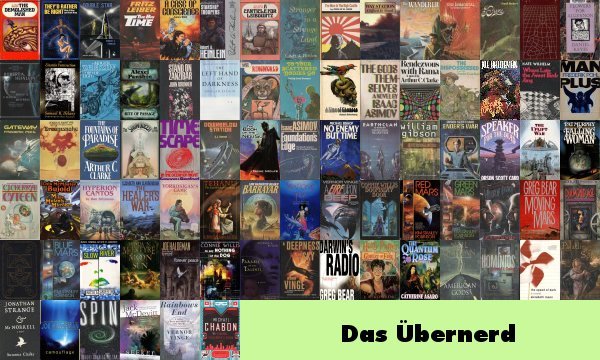 The Moon Is a Harsh Mistress
The Moon Is a Harsh Mistressby Robert Heinlein
1967 Hugo Winner for Best Novel
And so we've reached the end of Heinlein's record four Hugos for best novel. After The Moon Is a Harsh Mistress even the biggest Heinlein fan has to recognize that there is a dramatic shift in his writing. He had major health problems for an extended period that started shortly after this and he never really recovered completely. For his last Hugo winning novel Heinlein went out with a bang. The Moon Is a Harsh Mistress is easily my favorite of his novels.
In the not too distant future the moon has become a penal colony where undesirables are sent to grow crops for an overpopulated earth. This has been going on for three generations and now the moon is populated by a mix of political prisoners, authoritarian administrators, and their descendants. The authorities are getting harsher and demanding more from the colonists but the moon is rapidly running out of resources. Within just a few years the moon will no longer be able to sustain its population but the authorities refuse to acknowledge that a problem exists. And so a computer repairman, a political science professor, a firebrand, and an AI hidden within the mainframes that run the colony take it on themselves to start a revolution.
You could almost rename the first portion of the book "How to Overthrow a National Government"; it's practically a guide to holding a revolution (for those of you thinking about getting your own third world nation step one is to have a situation ripe for revolt so it's unlikely that you'll be able to conquer Arizona this way). While there are eventually violent clashes the real battleground is in the minds of the people. The violent clashes aren't between equal forces, it's a mob against the police. This isn't like most plucky good guys versus authoritarian government stories that are so common in science fiction; Heinlein brings the conflict down to a very realistic scale.
The second portion continues this with Heinlein acknowledging that when a bad government falls it doesn't mean that things get easier. The newly free lunar colonists face counterstrikes from earth, complicated negotiations, and the growing pains of establishing a functioning government. Most of the revolutions in the twentieth century resulted in the people who ousted their government being stuck with something just as bad when it was done and even after throwing off the shackles of their oppressors the moon is in danger of following that same path. Africa in particular was undergoing these rapid governmental turnovers at the point that Heinlein was writing The Moon Is a Harsh Mistress and it clearly affected what he wrote.
The book is written in a rather odd dialect of English that can be annoying as you start the novel. Style is clipped. Abbreviated. Like this. I found that I was able to get past it fairly quickly but I know some people who find it too annoying to read. It does help that only the narrator speaks this dialect while other characters have their own voice.
And speaking of characters, The Moon is a Harsh Mistress has as rich of group as you could hope to find. Mannie the computer technician doesn't want to overthrow the government but feels he doesn't have a choice. Professor Paz wants to tear down all of the institutions and not have anything in their place. The AI Mike sees the revolt as the greatest of all practical jokes but may not be stable enough to see it through to the end. Unfortunately Wyoh, the lone major female character, drifts off stage once the conspiracy to overthrow government begins, though she at least isn't sitting around pining for Manny while waiting for the men to do all the work.
The lunar society is clearly a frontier one and is well built around the idea that almost everyone there is fiercely independent. Life is cheap on the moon and the environment is unforgiving (one might say that the moon is a harsh mistress but that would be silly). It's a society built on the idea that "There ain't no such thing as a free lunch." Even the air isn't free on the moon and the whole situation drives people to be as self-reliant as possible.
The thing that I appreciate the most about The Moon Is a Harsh Mistress is the depth of the society. The colony, the revolution, and its aftermath feel plausible and so they carry more weight than heroes who attack the governor's palace and then everything afterward is all better. Heinlein does slip into political lectures occasionally at least they're far more justified here than in Starship Troopers. The Moon is a Harsh Mistress is Heinlein at his peak and its well worth reading.
